“I worked 12 hours a day on a diet of soya beans and seaweed. Prisoners were rarely given fat in their diet and we all were continuously hungry. The majority survived on barley, green stew, meat or fish once a month and seaweed stew.”
~Harry Carver
Japanese Prisoner of War
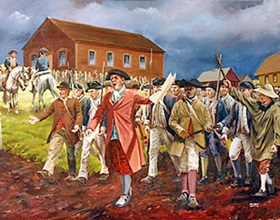
1786 – Shays’ Rebellion, an armed uprising of Massachusetts farmers, began in response to high debt and tax burdens.
The Massachusetts legislature raised taxes to pay off their large Revolutionary war debt. Taxes on land rose more than 60% between 1783 and 1786.
Revolutionary War veteran Daniel Shays led four thousand rebels in rising up against perceived economic injustices and suspension of civil rights (including multiple eviction and foreclosure notices) by Massachusetts, and in a later attempt to capture the United States’ national weapons arsenal at the U.S. Armory at Springfield.
Although Shays’ Rebellion met with defeat militarily against a privately raised militia, it prompted numerous national leaders (including George Washington, who came out of retirement to deal with issues raised by Shays’ Rebellion) to call for a stronger national government to suppress future rebellions, resulting in the U.S. Constitutional Convention and thereby altering the course of U.S. history.

1869 – The Mount Washington Cog Railway opened, making it the world’s first mountain-climbing rack railway.
It is the second steepest rack railway in the world (after the Pilatus Railway in Switzerland), with an average grade of over 25% and a maximum grade of 37%.
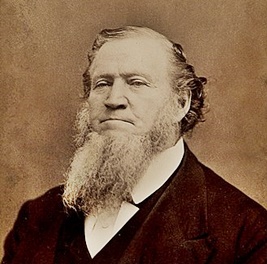
1877 – Brigham Young, the second president of the Church of Jesus Christ of Latter-day Saints from 1847 until his death, died of peritonitis from a ruptured appendix. He was 78.
He founded Salt Lake City and served as the first governor of the Utah Territory. Young also worked to establish the learning institutions that would later become the University of Utah and Brigham Young University.
Marriage Factoid: A polygamist, Young had at least 56 wives and 57 children.
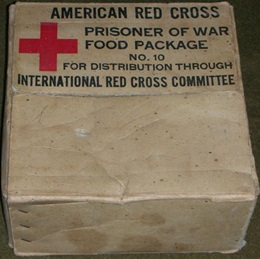
1942 – The Red Cross revealed that Japan had refused free passage of ships carrying food, medicine, and other necessities for American POWs held by Japan.
In January 1941, the U.S. government requested that the American Red Cross begin a blood-donor program to provide ready and ample supplies of blood plasma and serum albumin for transfusions for wounded soldiers. More than 13 million donations (each about a pint) were collected.
Tens of millions of food packages were prepared and funneled to Allied POWs through Geneva, which served as a clearinghouse. But getting such packages to prisoners in Japan proved particularly difficult.
Japan refused to allow even “neutral” ships to enter Japanese waters, even those on humanitarian errands. Despite protests by the Red Cross, Japan allowed just one-tenth of what POWs elsewhere received to reach prisoners in their territories.
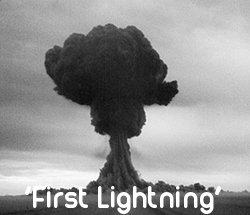
1949 – At a remote test site at Semipalatinsk in Kazakhstan, the USSR successfully detonated its first atomic bomb, code name “First Lightning”.
In order to measure the effects of the blast, the Soviet scientists constructed buildings, bridges, and other civilian structures in the vicinity of the bomb. They also placed animals in cages nearby so that they could test the effects of nuclear radiation on human-like mammals. The atomic explosion destroyed those structures and incinerated the animals.
The Soviet physicists who worked on the bomb were honored for the achievement based on the penalties they would have suffered had the test failed. Those who would have been executed by the Soviet government if the bomb had failed to detonate were honored as “Heroes of Socialist Labor,” and those who would have been merely imprisoned were given “The Order of Lenin,” a slightly less prestigious award.

1952 – Brunswick Pirates center fielder Mario Cuomo was hit by a pitch, which hospitalized him for a week. The injury prompted Cuomo to give up minor league baseball and pursue a career in law that culminated with him becoming governor of New York.
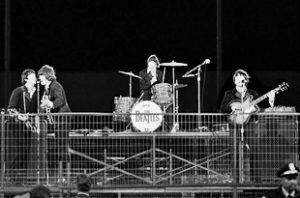
1966 – The Beatles played their last paid, public concert in front of 25,000 fans at San Francisco’s Candlestick Park.
Following the concert (which found them forced to play surrounded by a wire fence for security reasons), George Harrison said (only half in jest), “Well, that’s it. I’m not a Beatle anymore.” However, he was very serious when he explained the band’s decision to end touring.
“No one could hear us with all the screaming. I was thinking ‘This is going to be such a relief, not having to go through that madness anymore.’ It was a unanimous decision.”
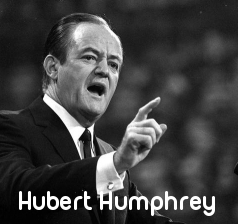
1968 – In Chicago, the Democratic National Convention nominated Vice President Hubert H. Humphrey for the presidency, bringing to a close the most violent political convention in U.S. history.

1979 – Jeffrey R. MacDonald was convicted of the 1970 murders of his then-pregnant wife and two daughters.
MacDonald was convicted of one count of first-degree murder in the death of his daughter Kristen and two counts of second-degree murder in the deaths of his wife Colette and other daughter Kimberly after the jury deliberated for just over six hours. He was immediately given a life sentence for each of the murders, to be served consecutively.
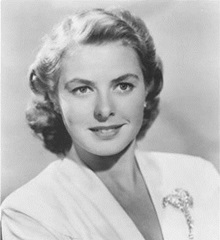
1982 – Swedish-born actress and three-time Academy Award winner Ingrid Bergman died of cancer in London on her 67th birthday.
Bergman, who was best known for her role as Ilsa Lund in Casablanca, won a Best Actress Academy Award for Gaslight and Anastasia, and also won in the category of Best Actress in a Supporting Role, for Murder On The Orient Express.
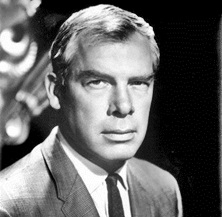
1987 – Actor Lee Marvin died of a heart attack at the age of 63.
Marvin starred as Detective Lieutenant Frank Ballinger in television series, M Squad, but is best known for his appearances in films such as The Wild One, Bad Day At Black Rock, The Man Who Shot Liberty Valance, The Dirty Dozen, Paint Your Wagon and Cat Ballou (for which he won the Best Actor Academy Award).
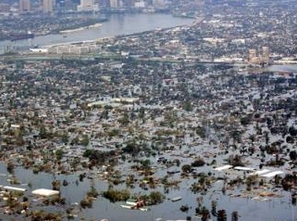
2005 – Hurricane Katrina made landfall near New Orleans as a Category 4 hurricane. Despite being only the third most powerful storm of the 2005 hurricane season, Katrina was the worst natural disaster in the history of the United States.
After briefly coming ashore in southern Florida on August 25 as a Category 1 hurricane, Katrina gained strength before slamming into the Gulf Coast on this date.
In addition to bringing devastation to the New Orleans area, the hurricane caused damage along the coasts of Mississippi and Alabama, as well as other parts of Louisiana. The storm also set off 36 tornadoes in Mississippi, Alabama, Georgia, Pennsylvania, and Virginia.
Hurricane Katrina was the most costly natural disaster in American history, with damages of more than $80 billion. In all, more than 1,800 people died, 1 million more were displaced and 400,000 lost their jobs as a result of the disaster.
Even one year later, despite efforts to rebuild the city, large parts of New Orleans remained heavily damaged and thousands remained homeless or unemployed.

2016 – Actor Gene Wilder died at the age of 83 from complications of Alzheimer’s disease.
Although his first film role was portraying a hostage in Bonnie and Clyde, Wilder’s first major role was as Leopold Bloom in the 1967 film The Producers for which he was nominated for an Academy Award for Best Supporting Actor. This was the first in a series of collaborations with writer/director Mel Brooks, including Blazing Saddles and Young Frankenstein.
He played the title role in Willy Wonka & The Chocolate Factory before co-starring in a number of films with Richard Pryor (Silver Streak, Stir Crazy, See No Evil, Hear No Evil, and Another You.
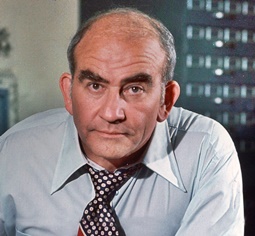
2021 – Actor Ed Asner died of natural causes at the age of 91.
Asner is the most honored male performer in the history of the Primetime Emmy Awards, having won seven – five for portraying Lou Grant (three as Supporting Actor in a Comedy Television Series on The Mary Tyler Moore Show and two as Lead Actor in a Dramatic Television Series on spin-off Lou Grant). His other Emmys were for performances in two miniseries: Rich Man, Poor Man in 1976, and Roots in 1977.
Compiled by Ray Lemire ©2024 RayLemire.com / Streamingoldies.com / All Rights Reserved.
I find it hard enough to keep One happy!
The Beatles as a group of 4 may have disbanded, but their music has certainly lived on, as well as the wonderful individual talents.
Thanks for the lesson, Ray!
True, Jim, 56 wives would not be easy to handle.
As for the Beatles, I was never one of those people who wished they had stayed together. If they had, we would have not been able to hear the wonderful music they gave us as solo artists.
Don’t blame the Beatles for packing in touring
I went to the premiere of a Hard Day’s Night in DC and you could not hear the soundtrack for all the screaming girls
Yesterday’s lesson and parts of today’s were real demonstrations of man’s inhumanity to many…the evil of hatred
A lot of class actors gone on this day
The screaming is still prevalent today at Taylor Swift concerts. I don’t know why anyone would pay the kind of money necessary to go to a concert and then scream all night, but whatever.
Evil has been with us since time began and it continues, unabated.
Read & now it’s time to fold the laundry that was done today. Will stay tuned for tomorrow. Enjoy your day 🙂 Lee